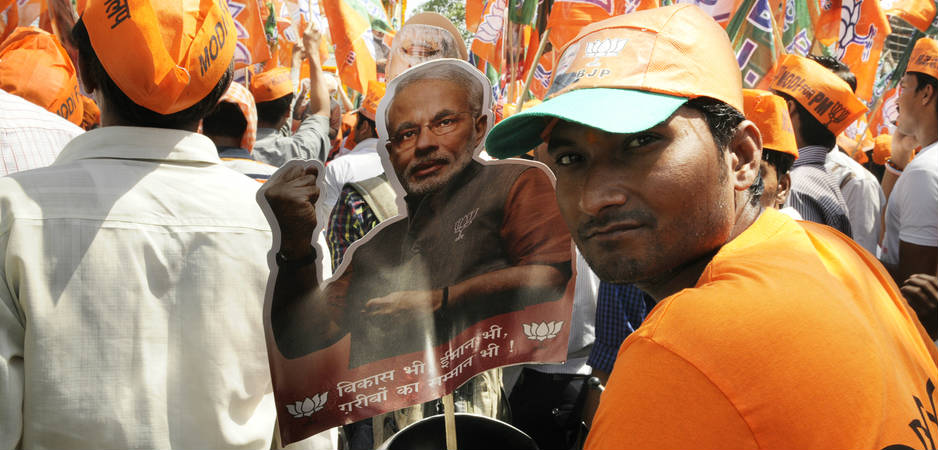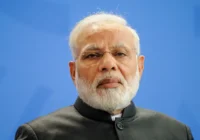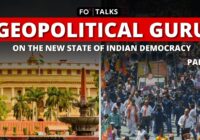Will Narendra Modi live up to the heightened expectations?
India’s Bharatiya Janata Party (BJP) can ignore its defeat in the by-polls only to its peril. The loss of the BJP ally Apna Dal’s seat in the state assembly to the Samajwadi Party is particularly galling. The assembly is in Varanasi, Indian Prime Minister Narendra Modi’s parliamentary constituency.
The reasons that a segment of Modi’s voters drifted away from the BJP needs serious introspection. The BJP could take the easy way out and go along with media pundits blaming Yogi Adityanath’s campaign based on “Love Jihad” for its electoral debacle. Adityanath’s campaign might not have been what the BJP wants to be perceived as, but to hold him singularly responsible for the debacle would be doing a disservice to the party. It would be equally preposterous to go into panic mode over the opposition’s hullabaloo regarding the people rejecting Modi’s model of development and governance.
The Modi Factor
The BJP’s poor performance in the by-polls reaffirms the fact that its dominance in the general elections was primarily attributed to the Modi “wave.”
People exasperated with the egregious governance of former Prime Minister Manmohan Singh saw Modi as a leader, who had transformed Gujarat and developed the state into a model of development and good governance. He was a study in contrast to Singh’s supine and scam-ridden government. Decisive, strong-willed and incorruptible, Modi was visualized as a leader who could lift India from the economic and social morass that it found itself stuck under Singh. A youthful demography favored Modi, as his development plank appealed to the youth who wanted a way out of the economic doldrums, which has in turn led to stagnation in employment generation.
Modi’s charisma even demolished the entrenched caste divide, which had become the bane of the Indian political system. The BJP’s spectacular performance in Uttar Pradesh (UP), winning 73 of 80 seats, exemplified that the Modi “wave” had demolished the caste citadel.
On the flip side, the “Modi factor” glossed over the inherent functional weaknesses of the BJP in states like UP. The party, which had been in a comatose state in UP during the previous decade because of infighting among senior leaders and their failure to connect with the common people, appeared to have overcome its shortcomings. But, truth be told, it was only Modi’s charisma that ensured the BJP reaped a rich electoral harvest. Volunteers associated with the campaign were witness to senior party functionaries staying aloof from the electorate because of their unwillingness to face the common people. These functionaries even made subtle attempts to sabotage the efforts of party leaders who were brought in from outside the state to resuscitate a dormant BJP in UP. The common people overlooked their state leaders’ apathy in their urge to bring Modi to power. It can be safely said that the BJP won UP over, despite its local leadership.
Senior national leaders, who were witnesses to the indifference of local leaders toward local problems, assured the people of change in the party structure, which would be inevitable once Modi assumed power. However, with Modi engaged in restructuring governance and the party itself facing a transition period, the change has failed to materialize.
The BJP needs to realize that the era of playing politics from the comfort of lounges and only making physical appearances during elections is over.
The BJP party structure in UP, like that of other parties, has become incestuous, leading to a deficiency of fresh blood infusions. Prescription to the dynasty cult has resulted in the party losing touch with the people. The dilapidation of the party has ensured that the common people have lost hope in the BJP. Indians, therefore, reverted to the time-tested caste politics, which favors the regional parties like the Samajwadi Party and the Bahujan Samaj Party during assembly elections. Bereft of any national accountability, regional parties played to the populist gallery, even at the cost of damaging the state’s interest.
Without any further ado, the BJP needs to take a serious look at its local units which, in the absence of any policy directives and programs from the state leaders, have become defunct. Local leaders need to be compelled to connect with the people and assist them in finding solutions to their grievances. In a striking example of the dysfunctional leadership in the BJP, not a single leader has taken to the street to protest against the abominable power situation in UP and Varanasi. If three Members of the Legislative Assembly (MLA), one Member of the Legislative Council (MLC) and the mayor of Varanasi — all of whom belong to the BJP — do not bother to venture out of their living rooms while the common people suffer due to prolonged power cuts, it would be foolhardy to expect Indians to extend political support to the BJP, despite Modi.
The BJP needs to realize that the era of playing politics from the comfort of lounges and only making physical appearances during elections is over. Modi’s victory itself is a prime example of hard work and sincerity paying electoral dividends. The Modi factor cannot be expected to act as an antidote to every problem resulting from a terminally ill local leadership.
People Power
Modi’s direct connection with the people was the most remarkable aspect of the general elections. Volunteers from all spheres of life — medical professionals, government officials, bankers, housewives and students — pitched in during Modi’s campaign. In what was reminiscent of the Indian independence struggle, people came together with the sole motive of changing a system they perceived as unfair to the meritorious, and tilted in favor of the influential. The Nehru-Gandhi dynasty became the symbol of promises that had gone awry. Former PM Singh was seen as a symptom of this venal politics. The gathering of hundreds of thousands of people on the streets of Varanasi during Modi’s nomination was a spontaneous outburst of this people power — opposition claims of “managed” crowds notwithstanding.
It was this yearning for change that overcame the inherent flaws in the BJP’s internal mechanism. People returned to the cities where they were registered as voters to ensure Modi’s victory. The BJP’s candidate became irrelevant. It was Modi the people wanted to succeed.
Therefore, the biggest problem Modi has confronted is the heightened expectations of the people. While they have the patience to give Modi and his team the time to rectify the bigger picture of defense, economy and foreign affairs, it is the management of smaller issues that has the potential to hurt the BJP.
The absence of law and order and the terrible power situation remains a major concern in UP. Although these issues are state subjects, the expectations from Modi have been raised to an extent that people expect his government to alleviate these problems. If the government does not improve critical issues, people revert to the political utilization of the caste system, which ostensibly acts a buffer for their protection from misgovernance. State assembly elections were a manifestation of this ailment.
The Bhumihar caste, which refused to support the Congress party candidate Ajay Rai on the basis of caste affinity during this year’s general elections and stayed firm with Modi, voted in good numbers for Ramakant Singh, an independent candidate in Rohania. Ramakant, a small-time strong man, supposedly acts as a protector for his caste people from the deprivation of other strong men who run amok because of lack of law and order. The BJP, with its effete local leadership, fails to stand up for the harassed citizen and thereby loses the moral right to seek votes during elections. It is this distribution of votes by infusion of the caste-based voting that will continue to hurt the BJP in state elections.
Shedding the Status Quo
State issues are not the only ones hurting the prime minister’s mandate. Modi’s ministers could sully his reputation as a fair administrator because of their mismanagement of governance. Since Modi has handpicked the ministers, the consequences of even one error of judgment would fall on him.
People who voted for Modi had opted for change – a change that would help a “tea seller” fulfill his destiny. India is at a crossroads with the establishment alarmed by Modi, who threatens their existence as he pushes forward with reforms in governance.
The appointment of a new chairperson to the Indian Institute of Advanced Studies (IIAS) has been one such debatable decision. The political affiliations of this newly appointed person toward the Aam Aadmi Party are no secret. This individual is an acknowledged Modi baiter. The appointment has raised the eyebrows of even Modi loyalists. Evidently, the appointment was carried through by chicanery by advisers of the Human Resource Development Ministry by concealing facts. This apathy in key appointments, which was the hallmark of the Singh government, will disillusion Modi supporters who expect him to rise above the rigmarole in governance.
The Indian education system requires sincere academics, whose credentials are beyond dispute rather than average academicians and bureaucrats with the “correct” connections. Such academicians are flag bearers of the status quo mentality that has failed the education system terribly. This ilk is apt at changing its stripes and is comfortable with any political establishment, irrespective of its ideology.
The education system needs vision to stop the continuous brain drain among students. Self-serving political appointees are not the remedy for a collapsing system. India has performed miserably in its effort to establish world-class universities, a fact evident in the absence of acknowledgement of any Indian educational institution at the international level. Scrounging at the bottom of the barrel because of personal connections while appointing institutional heads will push the education system closer to the abyss.
People who voted for Modi had opted for change – a change that would help a “tea seller” fulfill his destiny. India is at a crossroads with the establishment alarmed by Modi, who threatens their existence as he pushes forward with reforms in governance. But the indulgence of his ministers toward the traditional ruling class could derail the reformist agenda.
India voted for Modi, the game changer. It is time he changes the game for his government and party. Time, in politics as in life, waits for nobody.
The views expressed in this article are the author’s own and do not necessarily reflect Fair Observer’s editorial policy.
Support Fair Observer
We rely on your support for our independence, diversity and quality.
For more than 10 years, Fair Observer has been free, fair and independent. No billionaire owns us, no advertisers control us. We are a reader-supported nonprofit. Unlike many other publications, we keep our content free for readers regardless of where they live or whether they can afford to pay. We have no paywalls and no ads.
In the post-truth era of fake news, echo chambers and filter bubbles, we publish a plurality of perspectives from around the world. Anyone can publish with us, but everyone goes through a rigorous editorial process. So, you get fact-checked, well-reasoned content instead of noise.
We publish 2,500+ voices from 90+ countries. We also conduct education and training programs
on subjects ranging from digital media and journalism to writing and critical thinking. This
doesn’t come cheap. Servers, editors, trainers and web developers cost
money.
Please consider supporting us on a regular basis as a recurring donor or a
sustaining member.
Will you support FO’s journalism?
We rely on your support for our independence, diversity and quality.







Comment